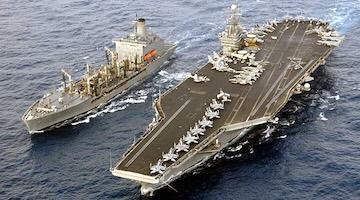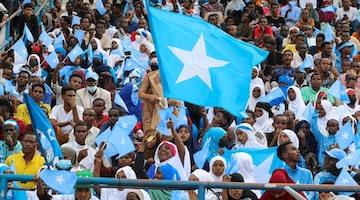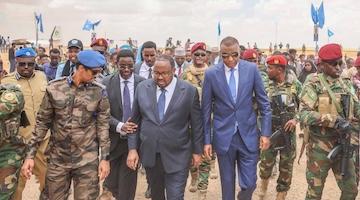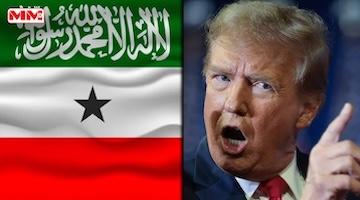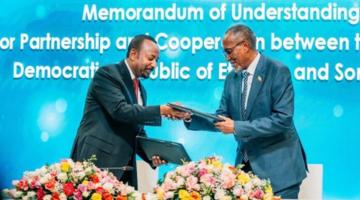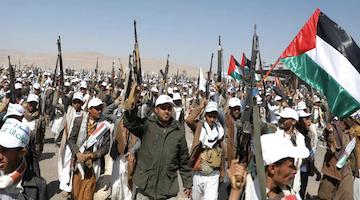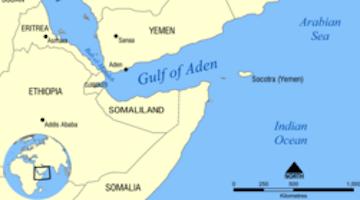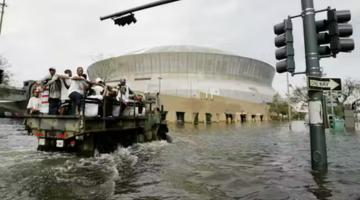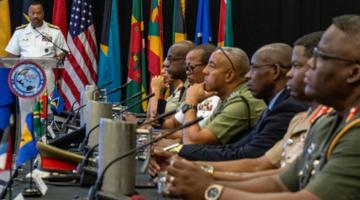Somalia’s current corruptionist comprador bourgeoisie has no independent socio-political base and is therefore totally beholden to Western imperialist interests.
“The country’s enormous untapped oil wealth and its crucial geographical location at the intersection of the Red Sea, the Gulf of Aden, and the Indian Ocean undoubtedly make it especially vulnerable to the strategy of ‘imperial zoning.’”
In early February 2021, the term of President Farmaajo came to an end. However, elections in the Somali capital of Muqdisho [Mogadishu] have been delayed due to disagreements between the President and the opposition – a coalition of regional governors and prominent national politicians, including the recently removed premier and two former presidents (1). This essay argues that the recurring political crisis between different ruling-class factions and between Muqdisho and the provinces has its roots not in the ideological afterlives of a precolonial ‘tribal’ mode of living – as per the dominant narrative, but in the country’s integration into the global capitalist-imperialist system since the late 19th century, and especially since the neoliberal recolonization of the country in the aftermath of the 1977–78 Ogaden War.
To historicize the present crisis, this essay will summarize the four distinct post-independence ruling class formations: the liberal comprador state bourgeoisie, the national popular state bourgeoisie, the neoliberal comprador state bourgeoisie, and the current corruptionist comprador bourgeoisie.
The First Republic and the Liberal Comprador State Bourgeoisie – 1960 to 1969
The arrival of European capitalist-imperialism onto the shores of historical Somalia (covering, along with the Somali Republic, the Ogaden and the Somali areas of Djibouti and northern Kenya) brought with it a subversion of the patrilineal political structure. The British and Italian colonial authorities in the two regions that formed the Republic in 1960 appointed intermediaries between themselves and the colonized masses. These intermediaries, known as ‘Cuqaal’ (‘Caaqil’ in the singular), “provided the link between the District Commissioner and the people of his district” (2). This subversion of existing patrilineal structures served to legitimize the presence of genocidal white-supremacist colonialism through the semblance of Somali participation. It is a role similar to this that the current Somali ruling class plays.
It was this privileged comprador class of Cuqaal, businesspeople, and functionaries of the colonial administrations that formed the political vanguard of the post-war nationalist struggle, culminating in the formation of the Somali Republic in 1960. This liberal comprador state bourgeoisie oversaw a state, Samir Amin writes, that “was a ‘neocolonial democracy,’ as were many African countries at the time. Its open economy, dominated by the traditional colonial interests of Europe (especially Italy and Great Britain), depended to an extreme on ‘aid’ (European and international)” (3). Mass discontent and the strengthening of the Soviet-supported military converged in the crisis brought about by the assassination of President Shar-ma-arke on the 15th of October 1969. Six days later, on the 21st, the military staged a coup, arrested senior figures, and abolished the institutions of the First Republic.
The National Popular Period and the National Popular State Bourgeoisie – 1969 to 1977
The military coup of 1969 was part of the rise of what Samir Amin has labelled ‘National Popular’ states that advanced the interests of the Global South against imperialism in the post-war ‘Bandung era' (4). This National Popular state, with the masses mobilized by the military, decolonized the minds of the population by introducing the Somali script, investing in cultural nationalism, increasing urban and rural literacy, and socializing education including at the university level. It strengthened the role of women in social life, and played a substantial role in the anti-apartheid struggle and the wider struggle for African liberation.
Neoliberal Recolonisation and the Neoliberal Comprador State Bourgeoisie – 1977 to 1991
This largely successful National Popular arrangement was abruptly ended by the opportunistic launching of the Ogaden War, in which the antagonism between the Somali nation and the Ethiopian state was exploited by Western geopolitical maneuvers, as seen recently in the Syrian Kurdish question. The National Popular state bourgeoisie transformed into a neoliberal comprador state bourgeoisie subservient to Western imperialist geopolitical interests – intermediated by the sub-imperial House of Saud, and implementing neoliberal programs imposed on the country by the instruments of recolonization – the International Financial Institutions (IFIs) and the Paris Club.
As the transformation of the state from National Popular to neoliberal increasingly eroded the material basis for nationhood, sectarianism intensified, and the state became ever more repressive, meaning that the masses were not able to unite to oppose the project of neoliberal recolonization which would culminate in the so-called ‘Civil War’ of the 1980s and 1990s and the subsequent statelessness.
Statelessness and the Corruptionist Comprador Bourgeoisie – 1991 to the Present
As the Cold War waned and the world entered a new era of imperialism under U.S. hegemony, the old strategy of subverting states by neoliberal Structural Adjustment was replaced in many regions of the Global South with a new strategy of state destruction, which Badiou calls “imperial zoning.” Badiou observes that “in certain geographical spaces full of dormant wealth, we can create free, anarchic zones where there is no longer any state, and where, consequently, we no longer have to enter into communication with that redoubtable monster that the state always is, even when it is weak” (5). The destruction of Congo, Iraq, Afghanistan, Libya, and Yemen are other examples of this strategy.
The country’s enormous untapped oil wealth and its crucial geographical location at the intersection of the Red Sea, the Gulf of Aden, and the Indian Ocean undoubtedly make it especially vulnerable to the strategy of imperial zoning. From the “War on Terror,” in which, under the guise of fighting “terrorists,” countless civilians are massacred by U.S. AFRICOM drone strikes, CIA-backed warlords, AMISOM troops, and Somali paramilitaries; to ecocidal practices such as deforestation, the destruction of marine life by transnational fishing corporations, and the dumping of nuclear waste, behind the country’s disastrous fate is its integration into the global capitalist-imperialist system.
The post-Cold War era saw the arrival of a new class. This new ruling class, which had parasitically grown in the neoliberal era, now consisted of corruptionist compradors, who, along with dismantling whatever remained of the state structure, systematically assassinating the intelligentsia, and adding millions to capitalism’s surplus humanity as defenseless refugees, opened the ecological system of the Republic to transnational corporations.
Amin defines the corruptionist comprador as one who “draws his wealth from his associations with the established political power holders and the foreign masters of the system—the representatives (especially the CIA) of the imperialist states or of the oligopolies. He operates as a highly compensated intermediary, profiting from an actual political rent that is the essential source of his accumulated wealth” (6). However, it is to be noted that the activities of this corruptionist comprador class are not to be seen as ‘corruption,’ since their incomes, especially in the form of aid, are salaries from imperialism for dutifully fulfilling their designated roles.
Sectarian Federalism: Dividing the Masses
With the crushing, under the pretext of counter-terrorism, of the national movements led by the Islamic Courts Union and the Alliance for the Reliberation of Somalia, the 2012 creation of the Federal Republic under the sectarian four-point-five system was the enshrinement of the corruptionist comprador bourgeoisie’s delegated role of maintaining the Republic as a permanently stateless zone.
Alex De Waal writes that “The federal system is designed to distribute rents broadly enough – and reduce Mogadishu’s role – to buy in everyone except those designated as terrorists or pirates. Historians will recognize this as a contemporary hybrid of protectorate and native administration” (7). However, this seeming hybridity is deceptive. Unlike the liberal comprador state bourgeoisie in the First Republic, which, due to the recency of the national liberation struggle and the Cold War balance-of-power, maintained some sovereignty; and the neoliberal comprador state bourgeoisie of the 1980s, which resisted certain imperialist diktats around Structural Adjustment and oil contracts; the corruptionist comprador bourgeoisie has no independent socio-political base and is therefore totally beholden to Western imperialist interests and the derivative interests of sub-imperial ruling classes – the Gulf monarchies and neo-Ottoman Turkey.
Regardless of the superficially endogenous character of the sectarian federal model, the system objectively functions to maintain the country as a stateless zone within the global white-supremacist capitalist-imperialist system, by engendering vertical solidarity from the masses of a particular patriliny to their respective corruptionist compradors; and horizontal antagonism between the masses of different patrilinies, who see in the ascendancy of corruptionists of other patrilinies a threat to the potential reception of “trickling-down wealth.”
The Current Impasse – A Ruling Class Spectacle
The ferocity of the arguments, the impassioned speeches, the standoffs on the streets of Muqdisho; the dramatic late night announcements of arrivals, departures, and failed negotiations; the affectedly grave diplomatic communiques of Western imperialism masquerading as the “International Community,” and the general interest in this election affair would suggest that something vital was at stake, maybe the viability of a Somali state, or perhaps the future of the non-existent yet oft-repeated “fragile peace.” In reality, the current spectacular impasse is a contest between different factions of the corruptionist comprador class to gain political rents for the stateless zoning of the country under the general purview of Western imperialism and the delegated purview of the sub-imperial ruling classes of the Gulf and Turkey.
This is not to say that the current impasse is inconsequential. A farcical intra-comprador struggle can, due to the aforementioned ideological and economic effectiveness of the imperially-imposed sectarian federal settlement, to certain sections of the masses seem to be a ‘tribal’ struggle, and this could lead to, although it is unlikely, a violent conflict. In this sense, there is potential for a farcical spectacle to turn into a violent reality.
This election impasse will likely be resolved either when one faction defeats the other or when the Western imperialist viceroys in Xalane/Halane (8) crown a new corruptionist administration in Muqdisho. For the masses, however, it will only mean a change in the figures carrying out the task of maintaining their country as a stateless zone.
Citations
1. Mohamed, H., 2021. What is delaying Somalia’s elections?. [online] Aljazeera.com. Available at: https://www.aljazeera.com/news/2021/2/10/what-is-delaying-somalias-election
2. Lewis, I.M, 2003. A Modern History of the Somali. Athens, OH: Ohio University Press.
3. Amin, S., 2011. Is there a solution to the problems of Somalia?. [online] Pambazuka.org. Available at: https://www.pambazuka.org/governance/there-solution-problems-somalia
4. Amin, S., 2019. Only People Make Their Own History: Writings on Capitalism, Imperialism, and Revolution. New York: Monthly Review Press.
5. Badiou, A., 2017. Our Wound is Not So Recent: Thinking the Paris Killings of 13 November. Cambridge: Polity Press.
6. Amin, S., 2013. The Implosion of Contemporary Capitalism. New York: Monthly Review Press.
7. de Waal, A., 2015. The Real Politics of the Horn of Africa: Money, War and the Business of Power. Cambridge: Polity Press.
8. Arman, A., 2019. Insecurity in Somalia: Is Mogadishu’s ‘Green Zone’ Part of the Problem?. [online] foreignpolicyblogs.com. Available at: https://foreignpolicyblogs.com/2019/09/06/insecurity-in-somalia-is-mogadishus-green-zone-part-of-the-problem/
Abdirahman A. Abdalla is a UK-based Somali Pan-Africanist Researcher focusing on Imperialism in the Horn of Africa. He can be contacted on twitter: @geylame9
This article previously appeared in Medium.
COMMENTS?
Please join the conversation on Black Agenda Report's Facebook page at http://facebook.com/blackagendareport
Or, you can comment by emailing us at comments@blackagendareport.com


